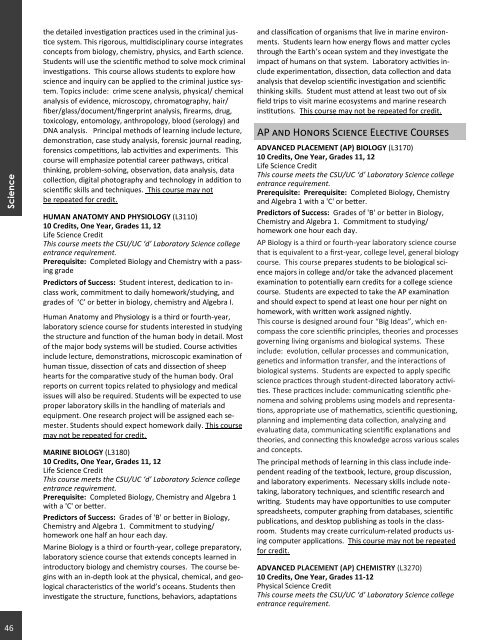You also want an ePaper? Increase the reach of your titles
YUMPU automatically turns print PDFs into web optimized ePapers that Google loves.
Science<br />
the detailed investigation practices used in the criminal justice<br />
system. This rigorous, multidisciplinary course integrates<br />
concepts from biology, chemistry, physics, and Earth science.<br />
Students will use the scientific method to solve mock criminal<br />
investigations. This course allows students to explore how<br />
science and inquiry can be applied to the criminal justice system.<br />
Topics include: crime scene analysis, physical/ chemical<br />
analysis of evidence, microscopy, chromatography, hair/<br />
fiber/glass/document/fingerprint analysis, firearms, drug,<br />
toxicology, entomology, anthropology, blood (serology) and<br />
DNA analysis. Principal methods of learning include lecture,<br />
demonstration, case study analysis, forensic journal reading,<br />
forensics competitions, lab activities and experiments. This<br />
course will emphasize potential career pathways, critical<br />
thinking, problem-solving, observation, data analysis, data<br />
collection, digital photography and technology in addition to<br />
scientific skills and techniques. This course may not<br />
be repeated for credit.<br />
HUMAN ANATOMY AND PHYSIOLOGY (L3110)<br />
10 Credits, One Year, Grades 11, 12<br />
Life Science Credit<br />
This course meets the CSU/UC ‘d’ Laboratory Science college<br />
entrance requirement.<br />
Prerequisite: Completed Biology and Chemistry with a passing<br />
grade<br />
Predictors of Success: Student interest, dedication to inclass<br />
work, commitment to daily homework/studying, and<br />
grades of ‘C’ or better in biology, chemistry and Algebra I.<br />
Human Anatomy and Physiology is a third or fourth-year,<br />
laboratory science course for students interested in studying<br />
the structure and function of the human body in detail. Most<br />
of the major body systems will be studied. Course activities<br />
include lecture, demonstrations, microscopic examination of<br />
human tissue, dissection of cats and dissection of sheep<br />
hearts for the comparative study of the human body. Oral<br />
reports on current topics related to physiology and medical<br />
issues will also be required. Students will be expected to use<br />
proper laboratory skills in the handling of materials and<br />
equipment. One research project will be assigned each semester.<br />
Students should expect homework daily. This course<br />
may not be repeated for credit.<br />
MARINE BIOLOGY (L3180)<br />
10 Credits, One Year, Grades 11, 12<br />
Life Science Credit<br />
This course meets the CSU/UC ‘d’ Laboratory Science college<br />
entrance requirement.<br />
Prerequisite: Completed Biology, Chemistry and Algebra 1<br />
with a 'C' or better.<br />
Predictors of Success: Grades of 'B' or better in Biology,<br />
Chemistry and Algebra 1. Commitment to studying/<br />
homework one half an hour each day.<br />
Marine Biology is a third or fourth-year, college preparatory,<br />
laboratory science course that extends concepts learned in<br />
introductory biology and chemistry courses. The course begins<br />
with an in-depth look at the physical, chemical, and geological<br />
characteristics of the world’s oceans. Students then<br />
investigate the structure, functions, behaviors, adaptations<br />
and classification of organisms that live in marine environments.<br />
Students learn how energy flows and matter cycles<br />
through the Earth’s ocean system and they investigate the<br />
impact of humans on that system. Laboratory activities include<br />
experimentation, dissection, data collection and data<br />
analysis that develop scientific investigation and scientific<br />
thinking skills. Student must attend at least two out of six<br />
field trips to visit marine ecosystems and marine research<br />
institutions. This course may not be repeated for credit.<br />
AP and Honors Science Elective Courses<br />
ADVANCED PLACEMENT (AP) BIOLOGY (L3170)<br />
10 Credits, One Year, Grades 11, 12<br />
Life Science Credit<br />
This course meets the CSU/UC ‘d’ Laboratory Science college<br />
entrance requirement.<br />
Prerequisite: Prerequisite: Completed Biology, Chemistry<br />
and Algebra 1 with a 'C' or better.<br />
Predictors of Success: Grades of 'B' or better in Biology,<br />
Chemistry and Algebra 1. Commitment to studying/<br />
homework one hour each day.<br />
AP Biology is a third or fourth-year laboratory science course<br />
that is equivalent to a first-year, college level, general biology<br />
course. This course prepares students to be biological science<br />
majors in college and/or take the advanced placement<br />
examination to potentially earn credits for a college science<br />
course. Students are expected to take the AP examination<br />
and should expect to spend at least one hour per night on<br />
homework, with written work assigned nightly.<br />
This course is designed around four “Big Ideas”, which encompass<br />
the core scientific principles, theories and processes<br />
governing living organisms and biological systems. These<br />
include: evolution, cellular processes and communication,<br />
genetics and information transfer, and the interactions of<br />
biological systems. Students are expected to apply specific<br />
science practices through student-directed laboratory activities.<br />
These practices include: communicating scientific phenomena<br />
and solving problems using models and representations,<br />
appropriate use of mathematics, scientific questioning,<br />
planning and implementing data collection, analyzing and<br />
evaluating data, communicating scientific explanations and<br />
theories, and connecting this knowledge across various scales<br />
and concepts.<br />
The principal methods of learning in this class include independent<br />
reading of the textbook, lecture, group discussion,<br />
and laboratory experiments. Necessary skills include notetaking,<br />
laboratory techniques, and scientific research and<br />
writing. Students may have opportunities to use computer<br />
spreadsheets, computer graphing from databases, scientific<br />
publications, and desktop publishing as tools in the classroom.<br />
Students may create curriculum-related products using<br />
computer applications. This course may not be repeated<br />
for credit.<br />
ADVANCED PLACEMENT (AP) CHEMISTRY (L3270)<br />
10 Credits, One Year, Grades 11-12<br />
Physical Science Credit<br />
This course meets the CSU/UC ‘d’ Laboratory Science college<br />
entrance requirement.<br />
46



